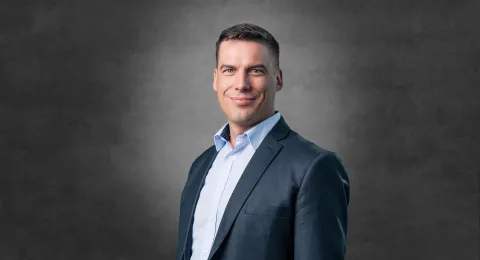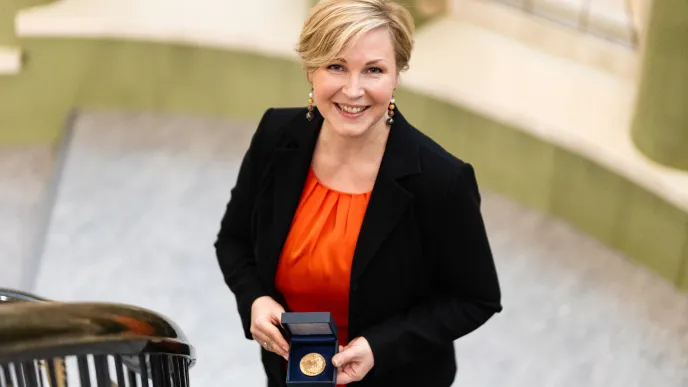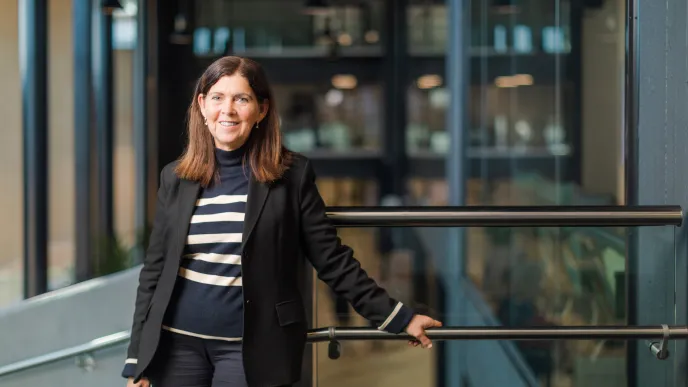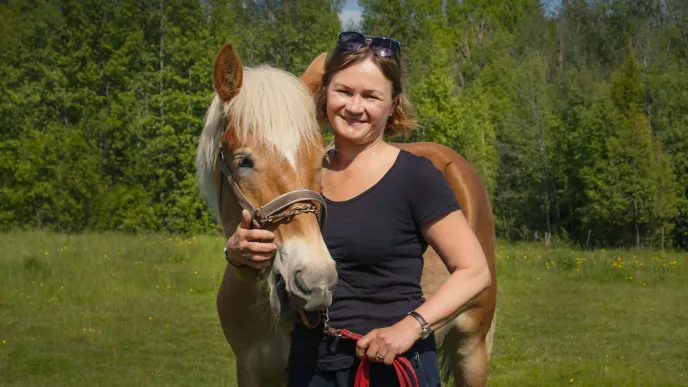Kimmo Rauma was no stranger to hard work even at a young age. During the harvest season, he was the first out on the strawberry fields picking berries, then cycled off to do farm work. Later, he got a job at a store checkout and ended his day mowing the lawns of properties being sold at auction.
“My parents were ordinary government employees. I was encouraged to work and praised when I did more than expected,” he says.
Rauma grew up in Parikkala and describes himself as a shy boy. Had he acted according to his naturally introverted personality, he says he wouldn’t have left home at all.
He read a lot, daydreamed even more, and was always curious about new things. He was fascinated by the impact of money and achieving results.
“I’ve always been highly ambitious, although I believe everyone is to some extent. Even someone who loves knitting socks doesn’t want to make the same kind every time. They’ll be tempted to try a pattern with Santa Claus, for example. How far ambition takes someone depends on their history and background – some are just dealt the right cards. And it depends on how much you’re willing to work and your courage to fail.”
Luck plays a role in life, but Rauma challenges that idea too.
“If a hockey player scores a game-winning goal thanks to a lucky bounce, is that really luck? No – it took an incredible amount of training and skill just to get into scoring position. You have to earn your luck.”
One of Rauma’s inventions may have been in your mouth
Rauma’s career has been on a steep upward trajectory. For decades, he’s worked in electrification and green technologies, co-founding multiple startups in fields like machine learning and dentistry. He and his team developed some of the first intraoral X-ray cameras – small black devices placed inside the mouth to capture X-ray images of teeth.
Rauma co-founded Visedo Oy, which created electric solutions for heavy industries. He spent 15 consecutive years traveling abroad several weeks a month – because it was the only way to ensure the company's international success. Under his leadership and “with a fantastic team,” Visedo grew and was acquired by the Danfoss Group in 2017. The company was rebranded as Danfoss Editron.
Under the new brand, Rauma moved to the U.S. with his family for three years, returning to Finland and settling in Lappeenranta in 2024. Today, he focuses on innovative carbon capture solutions as chairman of the board at Soletair Power.
His journey hasn’t been without hardship: he’s experienced bankruptcy and work-related burnout.
“It’s a bit of a cliché, but those experiences taught me that you don’t have to do everything alone. I became a better leader and a better person. Huge thanks go to the late Veijo Karppinen, LUT’s honorary doctor, who once took me under his wing as a mentor and became an investor in Visedo.”
Do what excites you and you’ll succeed
In three years, the Rauma family had settled into American life to the point that staying there permanently seemed like a real option. Rauma is well-practiced in analyzing the strengths and weaknesses of both Finnish and American culture.
“Finland is the country where the American dream is actually real – unlike in the U.S.”
According to Rauma, in Finland, everyone truly has equal access to education and health care. In the U.S., the system is elite-driven, filtering out only top talents. For those earning below the median income, illness can mean personal bankruptcy and lifelong debt.
“That kind of system creates constant anxiety. What happens if you break a leg in a biking accident, for example?”
For high earners, the U.S. is one of the best places to live, Rauma says. The culture is very work-focused and encourages entrepreneurship and success. And success is allowed to be visible. In the U.S., people shoot for the stars; in Finland, they tend to look to their neighbors for cues.
“Finland is a tranquil haven. Life here is extremely easy, even stagnant in a way. The system aims for mediocrity, which means we lose a lot of talent."
"It’s also the only country where the boss has to ask: ‘Would you mind doing this?’” Rauma grins.
He repeatedly highlights the importance of Finland’s health care and sense of security – he certainly doesn’t miss the American gun culture.
“In Finland, you don’t need the right connections to succeed. Success is possible if you do something you’re genuinely passionate about. If you’re only working for a paycheck, you won’t achieve the same kind of results.”

LUT must aim to be the most recognized university in its category
According to Rauma, LUT has made a “giant leap” during his seven-year term on the university board. In his words, LUT has transformed from a government-style project-driven institution into a results-oriented top university. Without this transformation, he believes LUT might have already been shut down.
“LUT is now among the world’s top 300 universities. Its brand is interesting and focused. Top individuals are starting to emerge, and top talents want to work with other top talents."
"LUT has a real opportunity to become the most recognized university in its category and a genuine international contender,” Rauma says.
LUT alumnus Rauma has a doctorate in technology and a portfolio of board positions. He knows that no amount of marketing money will turn LUT into Oxford.
“We can’t compete with centuries-old academic culture. We need to take the lead in a new category with no established frontrunner. Our value lies in sustainability thinking. We’re in the global top ten for climate action (THE Impact Rankings, SDG 13).”
Rauma believes it’s important not to become complacent with good achievements. LUT must prepare to take its next big step, even if it’s daunting or leads to temporary setbacks.
He questions why most of LUT’s board and consulting members are Finnish-speaking. The university’s Advisory Board is made up of experts who offer guidance on strategic development.
“They’re all excellent and accomplished people – but why almost exclusively Finnish? Why not have someone like the soon-to-retire Warren Buffett on the board?”
Buffett is one of the world’s best-known and most successful investors, with a fortune exceeding 160 billion dollars (approx. 150 billion euros).
“LUT must focus next on growth so that it becomes a credible option for top international researchers."
"Of course, the message within Finland must also be crystal clear. Our students should be spreading the word that LUT is an amazing place to study.”
Rauma believes Finland could better support immigrant integration by easing language requirements.
“Not all immigrants need to know or learn Finnish. In many workplaces – like LUT – English is more than enough.”
Most problems can be solved
Rauma encourages young people to boldly try out different career paths. He points out that in Finland, failure, even bankruptcy, is not the end of the road.
“As a Finn, you’re still wealthier than most people in the world. In general, there are very few problems in life that can’t be solved. I hope today’s youth already know to seek help early. Your mental health is not worth sacrificing for your job.”
Rauma says he’s reached a point in life where he wants for nothing. He has a wife and two sons, good health, and enough wealth to choose how he spends his days. In his view, people in his position have a duty to give back to society.
“I absolutely love working for LUT. I deeply appreciate the people doing the day-to-day work, and as a board member, I feel I’ve played a part in LUT’s amazing progress. That brings me happiness and joy.”
Read more about LUT's development:
Milestones and decisions
- LUT University maintains its top reputation in Finland
- LUT University and Clare Hall of the University of Cambridge establish joint agreement and annual Global Prize
- LUT University’s 2024 financial statement update: Growth, internationalisation, and impact
- LUT strengthens the role of its business school in Lahti
Discussions





